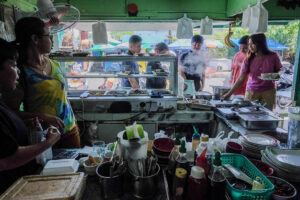Industry backs Senate bill on indigenous natural gas
THE PHILIPPINE Petroleum Association (PPA) of the upstream oil and gas industry is pushing for the passage of a Senate bill that seeks to promote the production of indigenous natural gas and liquefied natural gas as the country explores new energy reserves ahead of the expected depletion of the Malampaya gas field.

By John Victor D. Ordoñez, Reporter
THE PHILIPPINE Petroleum Association (PPA) of the upstream oil and gas industry is pushing for the passage of a Senate bill that seeks to promote the production of indigenous natural gas and liquefied natural gas as the country explores new energy reserves ahead of the expected depletion of the Malampaya gas field.
PPA President Edgar Benedict C. Cutiongo said the industry supports Senate Bill No. 2793, “Philippine Natural Gas Industry Development Act,” as the measure prioritizes local natural gas sources over imported fuel.
“This aligns perfectly with our mandate to explore and produce indigenous natural gas,” he told BusinessWorld in a text message on Monday.
Under the Senate measure, the government is tasked to “hasten the exploration and development of indigenous natural gas and facilities and prioritize the use of indigenous natural gas over imported natural gas to help attain greater energy security.”
The measure is currently under plenary deliberation, while its counterpart measure, House Bill No. 8456 has been approved on third and final reading in August 2023.
Manila is under pressure to find new energy reserves as its only indigenous source, the Malampaya gas field, is set to run out of recoverable gas using current techniques by 2027. The field supplies at least a fifth of the country’s power requirements.
In May last year, President Ferdinand R. Marcos, Jr. extended the Malampaya Service Contract 38 to Feb. 22, 2039, giving operators a 15-year window to further exploit the field beyond the initial Feb. 22, 2024 expiration date.
The government is trying to boost renewable energy’s (RE) share in the country’s energy mix to 35% the 22% these account for. The country is also aiming for a 50% share of RE in the energy mix by 2040.
‘PROBLEMATIC’ PROVISIONS
In a statement on Sunday, Senate Ways and Means Committee Chairman Sherwin T. Gatchalian said consumers may be forced to pay higher prices of electricity under indigenous natural gas plants since power generated from these are generally more expensive.
“This is problematic because consumers will be forced to pay the higher price of electricity whenever ING (indigenous natural gas) is more expensive,” he said, citing the provision in the bill giving priority to ING over imported natural gas.
Section 21 of the bill provided that the procurement and utilization of indigenous natural gas will be prioritized over imported natural gas.
“We need to ensure that every provision in this bill provides consumers with protection and would strengthen the whole energy sector and boost our economy.”
Mr. Gatchalian also referred to Section 6 of the proposed measure, which allows for the “full recovery of reasonable costs” incurred by power generators. He noted this is a “more lenient standard” compared to the “least cost” requirement outlined in the Electric Power Industry Reform Act.
To address this, the senator said the proposed measure should ensure that the Energy Regulatory Commission can protect consumers through the “least cost” standard when reviewing power supply agreements.























